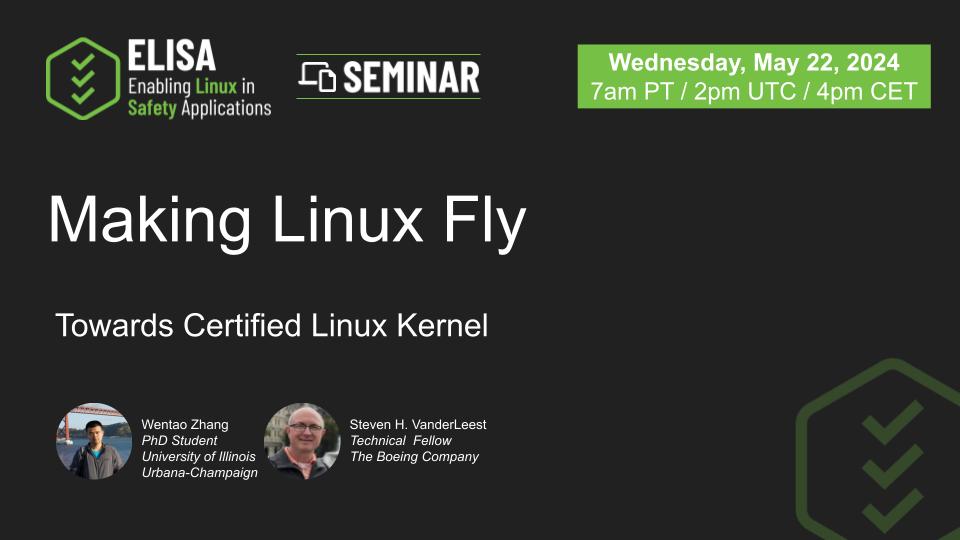

ELISA Project Seminar Series focuses on hot topics related to ELISA’s mission to define and maintain a common set of elements, processes and tools that can be incorporated into Linux-based, safety-critical systems amenable to safety certification. Speakers are members, contributors and thought leaders from the ELISA Project and surrounding communities. Each seminar comprises a 45-minute presentation and a 15-minute Q&A, and it’s free to attend.
Title: Making Linux Fly: Towards Certified Linux Kernel
Date: Wednesday, May 22, 2024, 7:00-8:00 Pacific / 14:00-15:00 UTC / 16:00-17:00 CET
Speaker: Wentao Zhang, PhD student at University of Illinois Urbana-Champaign and Steven H. VanderLeest, Technical Fellow at The Boeing Company
How to Attend: Register here in advance to attend for free. And please add the webinar joining details to your calendar from the confirmation email you will receive upon registering.
Abstract:
Although the Linux operating system has been used widely in many industries, adoption in aerospace has been slow due to the rigorous assurance evidence required as part of flight certification. The guidance for commercial flight software in most of the world is RTCA DO-178C, which identifies five progressively more rigorous levels of assurance. Providing the software life cycle data outlined by DO-178C is a daunting task for software as large and complex as Linux. In this project we focus on three objectives from DO-178C related to code coverage — the fraction of the source code that is exercised by testing. The three types of code coverage in DO-178C are statement coverage, decision coverage, and Modified Condition/Decision Coverage (MC/DC). The last of these, MC/DC, is only required for Software Level A, the highest level of assurance.
For operating system kernels like Linux, measuring code coverage is challenging because of the unique execution environment compared to user space. Measuring MC/DC is even harder given the intricacy of the metric and limitations of tools. We share our experience in measuring Linux kernel’s code coverage, with an emphasis on MC/DC. We describe how we have enabled measuring Linux kernel’s MC/DC for the first time, by enhancing both the toolchain and the kernel itself. We also discuss the generalizability of our approach across different kernel versions and opportunities for improving coverage with kernel testing suites like KUnit and kselftest.